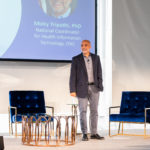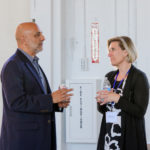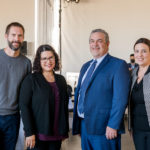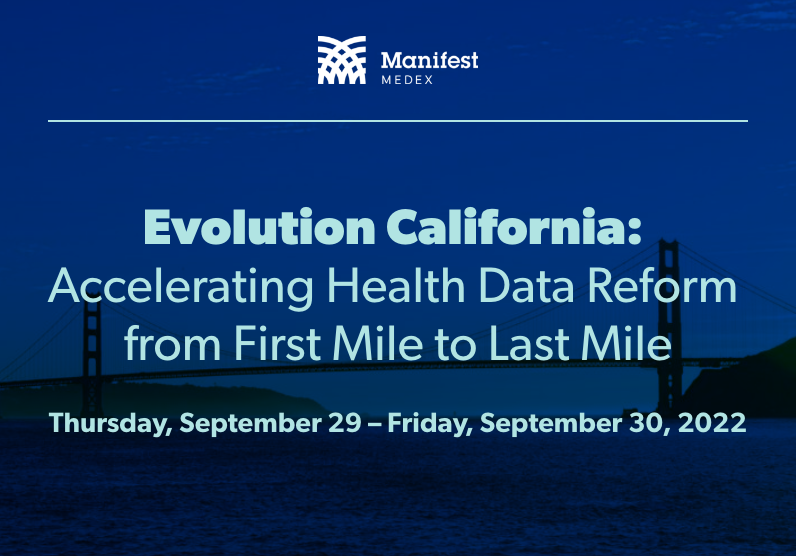
2022 Summit Recap – “Evolution California: Accelerating Health Data Reform from First Mile to Last Mile”
On September 29 - September 30, 2022, Manifest MedEx convened its inaugural health data policy-focused summit, “Evolution California: Accelerating Health Data Reform from First Mile to Last Mile!” The event was held at Fort Mason Center for Arts & Culture located on the waterfront of San Francisco, CA. Policy experts, health care leaders, and other community stakeholders from over 35+ agencies, associations, health plans, and healthcare organizations attended and discussed the health data and infrastructure needed to support California's audacious goals across Medi-Cal, public health, value-based care, and our communities.
During the summit, we focused on open and bold conversations about catalyzing health data infrastructure for equitable, person-centered, and effective health and health care. Each session connected experts in the industry to discuss topics impacting the exchange of health data from a range of different sector perspectives. We heard from several speakers about national efforts to advance the Trusted Exchange Framework and Common Agreement (TEFCA), California’s own Data Exchange Framework, CalAIM, public health data infrastructure, health equity, and more. However, we didn’t only discuss pressing topics ‒ we also provided time for our attendees, speakers, colleagues, and friends to meet and network at our evening receptions and our fun, outdoor lunch provided by some of San Francisco's best food trucks.
If you were one of the speakers or attendees who joined us those days, we appreciate you spending time with us and hope you found the event to be as informative and invigorating as we did.
Here are some highlights from the event:
Views from D.C. and Sacramento - how federal and state policy are catalyzing data-driven innovation
Of the many highlights of the summit, we were excited to kick off the event with our opening keynote speakers: Micky Tripathi, PhD, National Coordinator for Health Information Technology, Office of the National Coordinator for Health Information Technology (ONC), and Marko Mijic, Undersecretary, California Health and Human Services Agency.
Dr. Tripathi provided insight on public health modernization, highlighting ONC’s collaboration with the Centers for Disease Control and Prevention, while also sharing the vision behind the Trusted Exchange Framework and Common Agreement (TEFCA) and why it’s important for the progression of health. Marko echoed the importance of collaboration and interdependency of healthcare entities, emphasizing data equity and its impact on health and human services, and how we all play a role in the implementation and success of CalHHS’ Data Exchange Framework.
Erica Galvez, CEO, Manifest MedEx wrapped up the keynotes with a moderated Q&A chat, during which Dr. Tripathi and Marko shared their thoughts not only on real-time use cases like lab and disease reporting, syndromic surveillance, or even emergency response—but longer-term systemic ones, such as filling in missing patient records to understand and address the inequity of disease burden across communities (which we know is a priority for both Administrations).
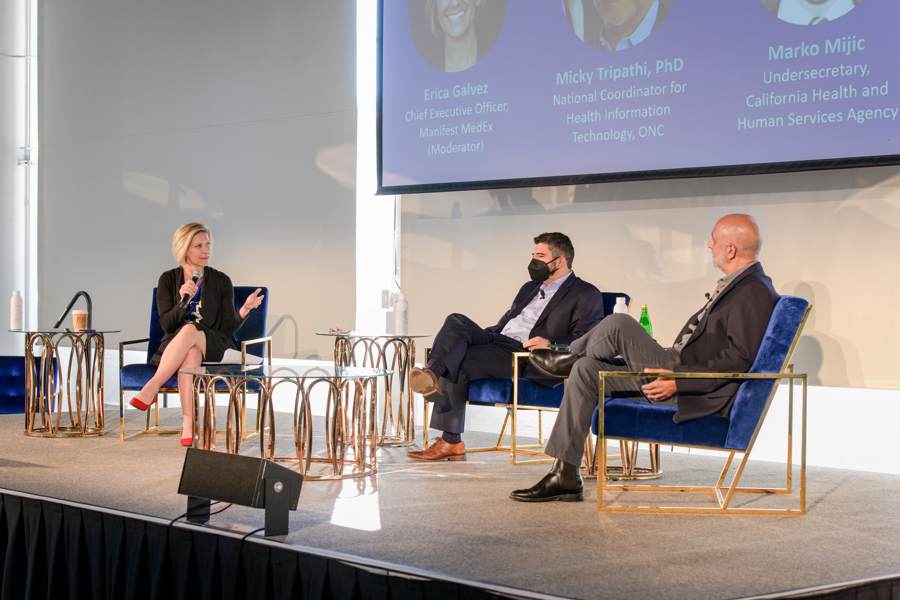
From left to right: Erica Galvez, Chief Executive Officer, Manifest MedEx; Marko Mijic, Undersecretary, California Health and Human Services Agency; Micky Tripathi, PhD, National Coordinator for Health Information Technology, Office of the National Coordinator for Health Information Technology (ONC)
Tackling better care for all Californians through solving data challenges
Amidst the hard work of building health data exchange and solving interoperability challenges through legislation, policy and payment reform, it’s easy to forget that this work is done in service of the individual patient and that health care – and health data – are personal. As we closed out Day 1 with “Practical Wisdom To Solve Big Data Challenges,” we heard from Erin Moore, Vice President of Operations, Blackbird Health, and long-time patient advocate, whose son has cystic fibrosis. She has manually collected data on his health and treatments since he was a baby, monitoring his responses and symptoms to changes in medications in detailed spreadsheets on her home computer. Erin spoke about how difficult it is to get her child’s healthcare records and to share the information she has collected as well – information that together paints the truest picture of her son’s health. She reminded us not to forget the patient in our work and that “Patients are the most underutilized resource in healthcare.”
Erin received a standing ovation from our audience, and many attendees were compelled to share their personal healthcare experiences with sick family members. We’re proud to help create open and honest conversations about healthcare and data sharing, so that these narratives can change positively in the future.
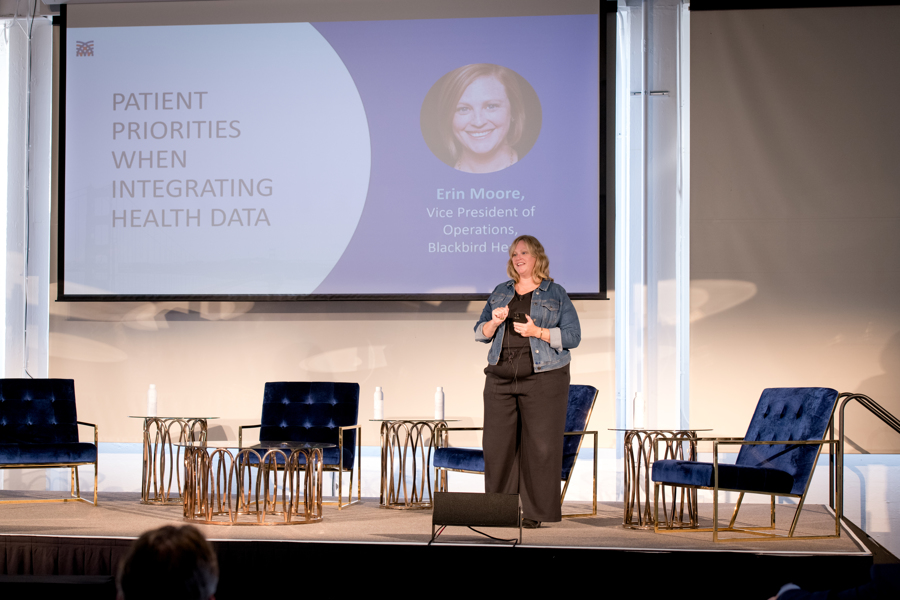
Erin Moore, Vice President of Operations, Blackbird Health and FDA Administration Patient Representative
The legislation and governance needed to accelerate health data reform to build a healthy CA for all
Our closing keynotes, Cary Sanders, Senior Policy Director at California Pan-Ethnic Health Network; Kristene Mapile, Assembly Health Committee Staff at California State Assembly; Robert Cothren, PhD, Consultant to The Center for Data Insights and Innovation (CDII) on Data Exchange Framework; Timi Leslie, Founder & President at BluePath Health, Connecting for Better Health; and moderator Lori Hack, Interim Executive Director, California Association of Health Information Exchanges, helped us consider what we need to do in California as next steps to achieve the goals of health equity and health transformation.
Dr. Cothren level-set the conversation with background on the Data Exchange Framework, including its progress to date and upcoming implementation milestones, setting the stage for Kristene to present insight into the Assembly Health Committee’s vision for health data sharing in the state. As a member of the Data Exchange Framework Stakeholder Advisory Group, Cary provided insight into her reflections on the process, highlighting the quest to advance health equity in data and how it ties into recent state legislative efforts such as SB 1033. To wrap up, Timi Leslie explained how HIEs play a critical role in CalAIM and public health, as it relates to creating a healthier CA for all.
We hope that this discussion created the format and connections needed to take bold steps forward as we head into 2023!
Photos from Evolution California



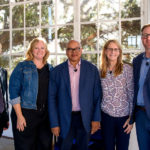




Additional resources:
To complement the program, we shared additional resources and supplemental background materials for speakers and attendees, which are provided below.
Evolution California Summit Information:
Resources & Background Materials:
- Assembly Bill 133 – state law establishing the California Health and Human Services Data Exchange Framework
- California Healthcare Foundation (CHCF) Topic – Data Exchange
- Data Exchange Explainer Series by Intrepid Ascent
- Lessons Lesson from California: Public-Private Collaborations to Foster Data Exchange by Timi Leslie
- California Health and Human Services Agency (CalHHS) Data Exchange Framework (DxF)
- CalHHS DxF Frequently Asked Questions
- CHCF blog post by CalHHS Chief Data Officer John Ohanian: “Data Exchange Is at the Heart of California’s Drive for Health Equity”
- DxF Public Webinar #1 Slides
- Final DxF, Data Sharing Agreement, and initial Policies and Procedures
- CalHHS DxF Strategy for Digital Identities
- California Department of Health Care Services: California Advancing and Innovating Medi-Cal (CalAIM)
- Population Health Management Initiative
- Behavioral Health Quality Incentive Program
- Other CalAIM resources
- California Association of Health Information Exchanges
- Trusted Exchange Framework and Common Agreement (TEFCA) Version 1
- Trusted Exchange Framework
- Common Agreement
- Resources (including Standard Operating Procedures [SOPs])
- Qualified Health Information Networks (QHINs)
- Recognized Coordinating Entity for TEFCA – The Sequoia Project
- Public health data systems
- Healthcare Information and Management Systems Society: Public Health Information and Technology Infrastructure Modernization Funding Report
- S. Government Accountability Office report: “Public Health Emergencies: Data Management Challenges Impact National Response”
- California Department of Public Health
- Spending Plan for Public Health Infrastructure Investment
- Future of Public Health Work Group Memo: “Investments and Capabilities Needed for the Future Public Health System”
- National Institutes for Health All of US Research Program
- Health Data Utility model
